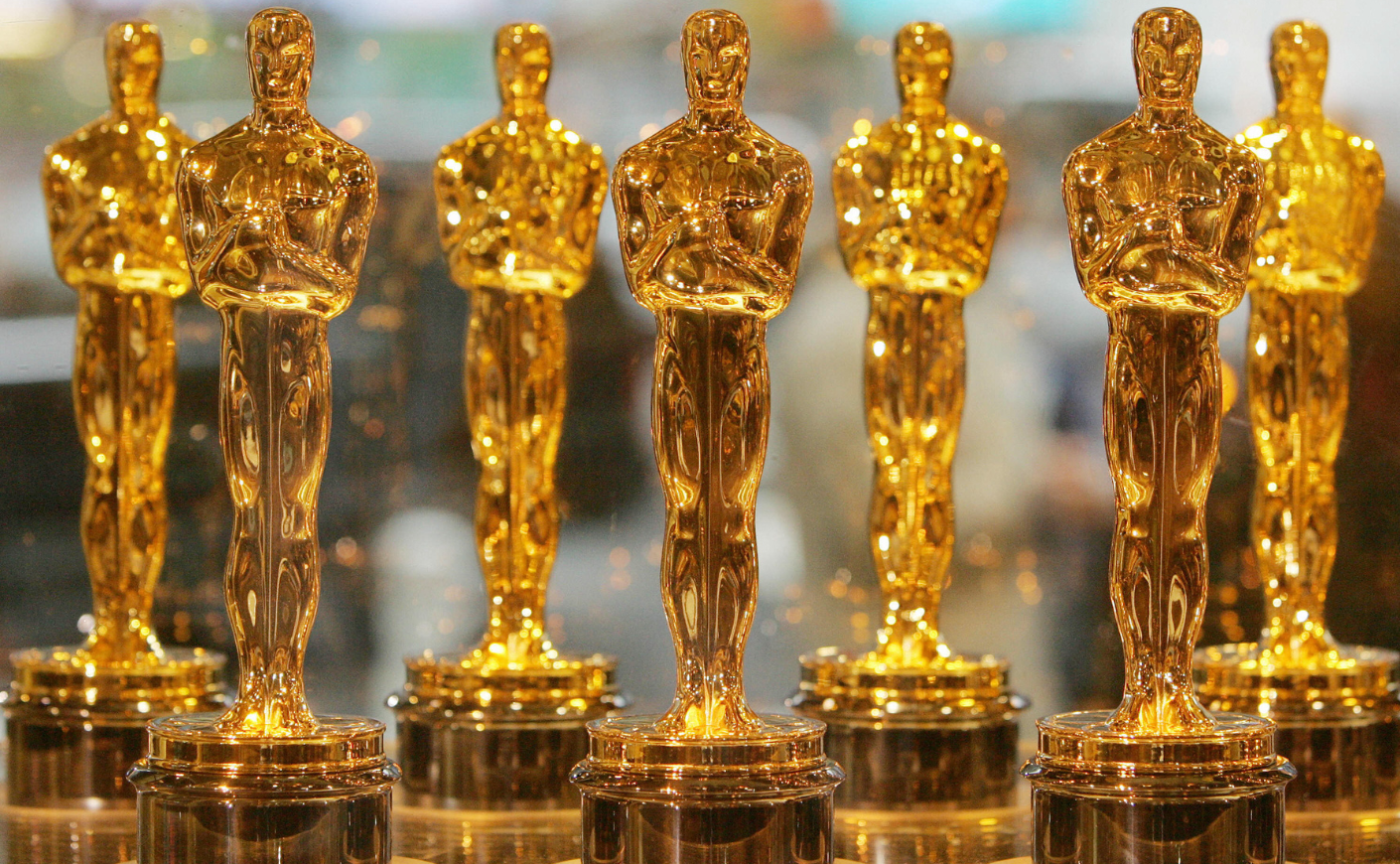When you settle in to watch the Academy Awards this Sunday, it'll probably feel like any of the prestigious nominees could go home with a coveted trophy. And that's true — anything could happen. But after months of campaigning and a slew of precursor awards (including the Golden Globes, Screen Actors Guild Awards, British Academy Film Awards, and more), most of the winners are already pretty clear to the people watching closely.
Lucky for me, I live with one of those people: My partner Matthew Jacobs is a major film buff and a pop culture reporter who contributes to outlets including Vanity Fair, Vulture, and TIME. (He's also dazzlingly handsome, but that's a story for another day.) During awards season, he keeps me abreast of what's happening — and what could happen — at all these ceremonies, so I thought I'd share his expertise with you, too. Read on for his well-informed take on who's most likely to bring home the gold this weekend, the blurry distinctions between certain categories, and whether any nominees might offer a politically charged acceptance speech.
Oscars Predictions 2024
Before we get into predictions, what are the biggest narratives you’re paying attention to going into the Oscars this year?
This is the first Oscars since a pretty tumultuous year for Hollywood, specifically concerning the dual labor strikes that occurred in 2023. It'll be interesting to see whether various winners address some of the existential issues Hollywood is facing, including a cut in spending for most of the studios. There are a lot of unknowns right now, and that may or may not weigh on people's minds as they attend this ceremony.
Then there’s the eternal philosophical question with the Oscars, which is: How many people will watch? The Oscars, like all live TV in the streaming era, have had declining ratings over the past several years. People often attribute that to the fact that the movies the Oscars recognize are too niche or obscure. Movies like Nomadland, Moonlight, and Parasite are, by most general audiences’ perception, “small” movies. Everyone is still chasing the year of Titanic, when the ratings were gargantuan.
This year, no one can complain that the movies are “too small” when the Best Picture frontrunners, Barbie and Oppenheimer, are two of the biggest hits of the year. There was a ratings increase last year, because Everything Everywhere All at Once was a big commercial hit, but these two movies were even bigger. So conventional wisdom would be that we’re going to see a highly rated telecast, but if that doesn’t prove to be true, I think it’s going to be a big philosophical quandary for the Academy to ponder.

Speaking of the Best Picture category, what do you expect will take home the biggest award of the night?
There’s almost no chance that anything but Oppenheimer will win — and that goes for the bulk of awards it’s nominated for, but especially Best Picture. It’s the success story of the year, not because it was the highest-grossing movie, but because it was the movie least affiliated with any franchise, intellectual property, or anything that we think of as guaranteed box office success. It's a way for Hollywood to honor something that managed to be both intellectual and popular, which is the sweet spot that the Oscars always strive to hit.
The other top contenders are Barbie, by virtue of its sheer popularity; Poor Things, because it’s the second-most-nominated movie of the year; and The Holdovers, because it's a crowd-pleaser made to evoke the golden age of '70s filmmaking.
Considering you expect Oppenheimer to win in most of its categories — and considering that Greta Gerwig was snubbed — does that mean Christopher Nolan is a lock for Best Director?
Pretty much. And if he does win, it will double as both an award for Oppenheimer and an award for his career thus far, since he hasn’t yet won Best Director at the Oscars, but he has made several movies that, again, hit that sweet spot of being intellectual and popular.
Does it at all delegitimize Christopher Nolan’s prospective win that Greta Gerwig isn’t among his competition?
Since we went into awards season saying this was the year of “Barbenheimer,” we expected Gerwig and Nolan to be the leading Best Director contenders, with Martin Scorsese as the spoiler choice. So I think it does suck a bit of the air out of the category because Gerwig isn’t in the mix. I don’t think anyone in the future will look back and say, “Well, Nolan’s win is contextualized through Gerwig’s snub.” But on Oscar night, it would’ve been more enticing to see the two of them against each other.
Let’s pivot to the acting categories. Who do you think will take home Best Actor?
Cillian Murphy as Oppenheimer has become the choice across the board for the precursor awards, and right now he has the edge. But similar to Nolan in Best Director, there are actors in this category who have been under-recognized over the years, like Paul Giamatti for The Holdovers, Jeffrey Wright for American Fiction, and even Colman Domingo for Rustin. Bradley Cooper has a lot of nominations to his name but not a win, which is its own talking point, but Maestro has not proven to be the force it once seemed like it could be. So there are a few possible career achievement prizes here, but I think it’ll be Murphy.

What about Best Actress? It’s the first category we’ve discussed that doesn’t have an Oppenheimer nomination.
I think we’re down to a two-way race, and it’s Stone vs. Gladstone: Lily Gladstone would be the first Native winner for Best Actress for Killers of the Flower Moon, and Poor Things would win Emma Stone her second Oscar. I don’t think it’s impossible for Sandra Hüller to score a surprise for Anatomy of a Fall, given that it’s been such a darling and the Academy is more keen to honor international films than it used to be. But the power of Gladstone’s performance, mixed with the historical nature of her prospective win, is going to push her across the finish line.

How about Best Supporting Actor?
This is a category of veterans. But one of them, in particular, is pretty much guaranteed to win, and that’s Robert Downey Jr. He’s had such a triumphant career arc over the past 20 years with his Marvel comeback, and he’s been able to parlay that into doing highbrow movies like Oppenheimer. It also helps that he’s extremely well-connected. He has a lot of friends in Hollywood, and we have to remember that Hollywood votes for these awards. Downey Jr. has worked with a lot of people over a lot of years, and he’s an extremely charming man who gives impeccable speeches at awards shows, so people want to see him talk.

To round out the acting categories, let’s discuss Best Supporting Actress.
Across the entire season, Da’Vine Joy Randolph has won essentially every award that there has been to win for The Holdovers. It was just one of those things that was anointed early on, and no one strong enough came around to change that.
You interviewed Da’Vine about this performance, which I know was one of your personal favorites of the year.
I did. I’ve interviewed her a couple of times as her career has accelerated. She’s a supporting player who can straddle the line between comedy and drama — she’s extremely funny and extremely emotional at the same time. She’s been great in Dolemite Is My Name, High Fidelity, and Only Murders in the Building. And in The Holdovers, she’s given this wonderful arc of emotions to play as a cafeteria worker at a prep school who’s just lost her son in the Vietnam War. The resonance of that character, mixed with the gratitude she’s shown as a relative newcomer to this business, has been an inspiring thing for the Hollywood community to see, and I think people are really happy for the Da’Vine sweep this season.

Those are probably the categories most people will pay closest attention to, but what others do you think are worth talking about?
Well, since we mentioned the lack of competition between Nolan and Gerwig in Best Director, they are competing against each other in Best Adapted Screenplay. It’s possible that Gerwig and her partner Noah Baumbach’s script for Barbie could beat Oppenheimer there, although it's a really stacked category. You’ve got Cord Jefferson for American Fiction, Jonathan Glazer for The Zone of Interest, and Oppenheimer could take it, too. But I wouldn’t be surprised if Barbie gets a screenplay prize, partly as a consolation that it won’t win Best Picture and didn’t get a Best Director nomination.
You interviewed one of the contenders for Best Original Screenplay that you think has a pretty good shot, right?
Yes, I talked to Samy Burch, who wrote May December. It’s a movie that, at one point, people expected would get a handful of nominations, but it didn’t end up playing as strongly with the Academy as we thought. It’s sort of a Hollywood satire that critiques the ethics of being an actor, and I think that turned off some people in the industry. But it’s the wittiest and most inventive original screenplay of the year, and I think Burch has a big career ahead of her.
Some of the distinctions with Oscar categories can be a little confusing for casual viewers, and since we’ve heard so much about May December being inspired by the story of Mary Kay Letourneau, explain why this is up for Best Original Screenplay instead of Best Adapted Screenplay.
That’s a good question, because Warner Bros. had originally positioned Barbie as an original screenplay, and there was pushback on that. The Academy’s screenplay branch ruled that it had to move to the adapted category because it’s based on a Mattel property, even though there’s no singular story being adapted, like you would have with a novel. The full credit there says it’s “based on characters created by Ruth Handler,” the creator of Barbie. It’s a constant conversation, and movies can get shuffled from one qualification to another.
So with May December, it’s inspired by a true tabloid story from the ‘90s, but not any one specific depiction of that story. It’s like if someone created a new film about the Holocaust — is it adapted because it’s inspired by the Holocaust? No, it’s an original story about a historical event. The same is true for Maestro, another nominee for original screenplay. It’s a biopic about Leonard Bernstein that uses his music and his biography, but isn’t adapted from a specific source.
The Katie Couric Media community loves documentaries. What stands out to you in the category for Best Documentary Feature?
I’ve got my eye on Four Daughters, which is told through a really inventive format that blends genres. It’s about a Tunisian family in which two of the four sisters fled home and joined ISIS. Eventually they were imprisoned in Libya as jihadists, and they still are. Their mother is petitioning the government to release her daughters, who were enacting a very specific and very dark version of teenage rebellion by leaving home. The director, Kaouther Ben Hania, who I interviewed, hired two actresses to play the missing sisters, as well as an actress to play their mother, and those actors join the actual family to recreate scenes from their life together. It’s essentially a movie-length therapy session about what led these girls to leave home in such an upsetting way. The innovative, docu-fiction approach really sets this movie apart from the others in the category.

Speaking of geopolitical issues, we saw at the Independent Spirit Awards a couple of weeks ago that a pro-Palestine demonstrator interrupted the ceremony. What do you think the political climate we’re in now might mean for the Oscars?
Speaking out in support of Palestine has become a real litmus test in Hollywood lately. The conflict is so complicated, visceral, and polarizing, and we’ve seen some examples of people reportedly being fired from projects for what they’ve said. Hollywood is known for protesting wars — we’ve seen the Vietnam War and the Iraq War vehemently protested at the Oscars in the past. But the Israel-Hamas War is one where many feel the industry has been conspicuously quiet, and for people who are critical of the United States’s response, it’s been a source of consternation that celebrities with large platforms haven’t used that platform to advocate for a ceasefire or for more aid being sent to Gaza.
This year, there have been strikingly few acceptance speeches addressing the issue. But people write speeches with minimal risk for the shows that air before the Oscars, and that’s because they want to eventually win an Oscar. There are no more awards to win after this, so will that embolden people to address what’s happening? Or has there been a ripple of fear throughout the industry that people will lose jobs for saying the “wrong” thing about a conflict where people strongly disagree about what the “wrong” thing is?
Let’s end on a lighter note: What’s your personal favorite movie of the year?
My favorite is May December, and my other choice would be The Holdovers. To recommend something that didn’t get any Oscar attention, I’d say You Hurt My Feelings, a wonderful comedy starring Julia Louis-Dreyfus. It’s about a writer whose husband confesses he doesn’t like her new book, and it sends her on a spiral. It sounds like a small plot, and in some ways it is — it’s not the invention of the nuclear bomb. But it’s one of the funniest, most observant movies of the year, even if you haven’t and never will write a book.









